题目内容
You may complain that there are too many tests on the way to college entrance, but an increasing number of students want to take one more. That is the Scholastic Aptitude Test, or SAT, an American test for students who intend to apply for college admission.
Chen Huanlu, aged 18, from Shandong Province took part in the SAT subject tests (SAT 2) in Hong Kong on June 2. She has also been scheduled to take the SAT reasoning test (SAT 1) in October.
“I hope to study environmental engineering at an American university, where I may have more opportunities to get cutting-edge (前沿的) knowledge in this area,” said Chen.
However, not all SAT test takers want to apply to American universities.
“I wanted to see how I would do when faced with plenty of stress and also to evaluate (测评) my scholastic level by an American standard. The SATs made my school life more diverse,” said Senior 2 student Zhou Yuxiang from Sichuan Province.
Zhou, aged 17, a top student in his school, was inspired by some of his friends. They have taken this test and been admitted to American universities, including Harvard and Yale. Last winter vacation he took a 20-day SAT course at Chengdu New Oriental School.
“As I prepared for the test in the following months, I was forced to balance my everyday schedule better. Fortunately I was optimistic enough to have undergone the most difficult time,” he said.
In May and June, Zhou flew alone to Hong Kong to sit for the SAT1 and SAT2.
“They are both the standards which have been set for us to reach. What we should do more sensibly is to try harder to prepare for them. Survival of the fittest (适者生存) is true both in America and in China. That is something I have learnt beyond the SAT itself,” he said.
1. The SAT is a test designed mainly for _________.
A. Chinese students who want to go to college in America
B. American students who intend to apply for college admission in China
C. students who plan to apply for American universities
D. students who want to learn about the survival of the fittest
2. What can we learn about Chen Huanlu according to this passage?
A. She doesn’t like the college entrance examination in China.
B. She has taken part in both SAT 1 and SAT 2 in June.
C. She is interested in environmental issues.
D. She wants to get cutting-edge knowledge from SATs.
3. By taking Zhou Yuxiang for example, the author wants to tell us that ________.
A. all the students who take SATs intend to apply to American universities
B. some SAT takers simply regard the SAT as a challenge
C. he just takes the test for fun
D. SAT 1 and SAT 2 have something in common
4. What do Chen Huanlu and Zhou Yuxiang have in common?
A. They both took part in the SAT subject tests in Hong Kong.
B. They are both students of Senior 2.
C. Both of them attended a SAT course at New Oriental School.
D. Both of them came from the top schools.

